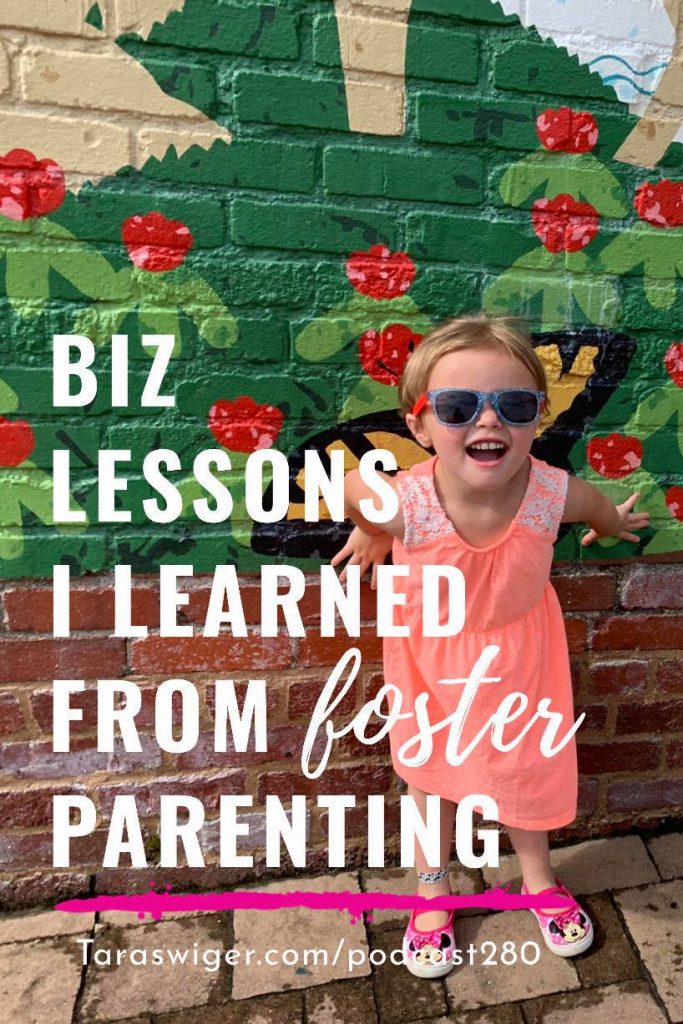Podcast: Play in new window | Download
So hey, I became a parent this year! I parented 5 kids in 12 months, not concurrently but consecutively. And in this year of parenthood, I have learned a LOT about myself, my worldview, my marriage AND my business.
Today I want to share what parenting has taught me about business.
This episode is ultra-vulnerable, because I usually talk about stuff that I know quite a bit about, that I’ve researched and experienced. Well, parenting is not really my expertise. And I’m gonna be honest – I wanted to be a parent for SO LONG that when it DID happen, but in a very nontraditional way, I still feel a little bit of imposter syndrome.
I am NOT a parent the way most parents are. I did not give birth or get pregnant. I also didn’t lose pregnancies or go through massive infertility treatments. And I haven’t adopted a child. So right now, I don’t actually, legally, HAVE kids. I temporarily have kids, but as you can imagine, the day to day of parenting feels very very real. Heck, it IS real.
I am having the experience of parenting even if I’m not legally a parent yet.
So, as you can tell, I feel kinda nervous about talking about this, but I know that we ALL have things we’re inexperienced about, and learning THROUGH the inexperience is how we improve.
Now before we go farther, let me just say to all my sisters who are feeling pain around not being a parent yet, and really really wanting to – you might wanna skip this episode. I know that in the past I found all KINDS of things triggered my grief, and I would HATE when a business teacher would talk about kids as if we all just had kids, no problem, no struggle.
That said, I encourage EVERYONE to consider foster care as a way of pouring your time and energy and resources and privileges into someone’s life. Someone very cute. So if you don’t have kids yet, and you’re even considering foster care a little bit, stay tuned and check out my videos about the process of becoming a foster parent.
And of course if you are a parent, through traditional or nontraditional methods, stay tuned because I think you’re going to enjoy noticing how business and parenting overlap in so many ways.
Work on your STUFF
The first BIG lesson of having a business or being a parent is this: If you don’t deal with your stuff now, you’re going to have to deal with it later.
Both parenting and business serve as a magnifying glass for all the STUFF you need to work through to move forward.
What do I mean by stuff? Whether it’s mental health stuff like anxiety, depression, eating disorders or it’s stuff from your own childhood or past relationships, both business and kids are going to bring it up again.
I have long said that business is one of the best therapists, because it is ALL going to come up. As you set goals, level up, move forward, you are going to come up against your own feelings of inadequacy, worthiness, confidence, mindset. If you don’t work through it, release it, or in some way transform your stuff, it’s going to KEEP coming up. You’ll end up self-sabotaging or getting stuck or feeling horrible instead of happy.
And oooh boy, if this is true of business, it is doubly true of becoming a parent.
Every bit of unhealed trauma, grief, and fear from your childhood comes and smacks you in the face when you’re taking care of tiny children. (Or is that just me?)
I got a head start on working through my stuff and develop a support system for it, while building my business. I had to work through stuff about being worthy, about mindset, about clear communication in order to grow through my business.
That has made me able to move through it quicker (than I used to) when it came to kids. But for my husband, he struggled. He’s had to develop ways to calm down, to recharge, to release stuff, to confront himself and forgive himself…while in the middle of parenting toddlers.
So really this first lesson is: work on your stuff. Now or later, you’re going to need to. If you had kids first, hopefully you’ve learned to identify some of this stuff and you’ve already started the process.
(And PS, business and kids aren’t the ONLY ways to work on your issues, they’ve just the two biggest triggers for what I’ve needed to work on! Relationships are another big trigger for people – whether friendships or romantic relationships.)
The next lesson is about TIME
Oh my gosh, I never felt like I had so little thinking time in my LIFE!
It has forced me to get very clear on when and how I work best – what I need to be most productive.
What I’ve learned is that I need dedicated focused time in order to do most of what I do.
And Introvert Recovery cannot be skipped – the longer I spend surrounded by kids and NOT working, the more I need to recover before I can be productive. This is counter-intuitive and VERY annoying, but I’ve found it to be true, so now I just try to build it in when I can.
My other “hack” around this is to squeeze all appointments into same day and have days that I never schedule anything kid-related (of course DCS does not really respect my boundaries, but when possible, I stand up for them.) It all comes down to the fact that time management is so much more crucial now that I have kids, so I’ve had to get better at it.
Communication
Dealing with toddlers requires clear communication.
Dealing with DCS and birth parents and other adults in your kids life requires clear communication.
And guess what? Your business, especially your marketing messaging requires clear communication!
One of the keys to clearly communicating is to always ask yourself: What is the goal of this communication?
What is the goal of this foster care meeting? What is the goal of this outburst? What is the goal of this Instagram post or email or item description?
You’re always trying to communicate something to someone.
By getting clear on what the goal is and who the intended audience is, then you can shape your message around that.
And yes, I am encouraging you to take a minute and think through what you’re about to say, so that it’s clear to everyone what your goal is.
If we’ve ever been in a conversation together, you know that I am not going to let you go until I know that we have met the goal. This has been so useful in working with birth parents and DCS.
For example, in a meeting with a social worker and some family members, I could tell that the worker was focused on just saying what she wanted to say (in industry-speak) and that family members didn’t understand the seriousness or what’s at stake. So I stopped the worker, over and over to ask: “So you’re saying….” and kept rewording it until I could tell family got it.
When we walked away, my husband said, “You were great. You probably really annoyed the social worker, but at least we know we got everyone on the same page.”
I credit my decade-plus experience of writing marketing messaging (and a stubborn streak that wants to make everyone feel included) to this skill, but it’s developed over time.
If you have been negotiating with toddlers, for a few years, I bet you have worked on your communication skills. (Simplicity! Clear requests!)
If you have been in a relationship for longer than a minute, you have worked on your communication skills.
The thing is, you can bring that INTO your business! Those skills translate!
ALL these skill translate!
Whether your life has inspired you to get good at working on your stuff, at time management, or at communication, you can now take those skills into your business!
Often we feel like we don’t know enough or we’re not good enough to create thriving businesses, to be profitable, to charge what we’re worth.
But you know what?
You are! You have the skills you need!
How to listen
- You can subscribe to it on iTunes (If you do, leave a review!)
- You can listen to it using the player above or download it.
- Subscribe or listen via Stitcher (or subscribe in whatever you use for podcasts – just search “Explore Your Enthusiasm” and it should pop up!).




